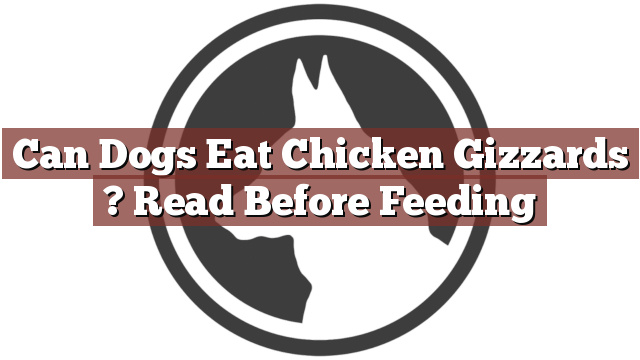Understanding Your Dog’s Dietary Needs
As a responsible pet owner, it is crucial to understand your dog’s dietary needs. Dogs require a balanced diet that includes proteins, carbohydrates, fats, vitamins, and minerals. While commercial dog foods are designed to meet these requirements, many pet owners like to supplement their dog’s diet with natural, whole foods. However, it is essential to research and understand which human foods are safe for dogs to consume before adding them to their diet.
Can Dogs Eat Chicken Gizzards? Read Before Feeding
Can dogs eat chicken gizzards? This is a common question among dog owners who are looking to diversify their pet’s diet. The answer is yes. Chicken gizzards are a healthy organ meat that can be included in your dog’s diet, but only in moderation. Gizzards are a good source of protein, vitamins, and minerals, including Vitamin B12, iron, and zinc. However, it is important to prepare them properly before feeding them to your dog.
To feed chicken gizzards to your dog, make sure they are fully cooked to avoid any bacterial contamination. Boiling or baking the gizzards is a safe and healthy way to prepare them. It is also important to remove any excess fat or connective tissue before feeding them to your dog. Remember to cut the gizzards into small, bite-sized pieces to prevent choking hazards, especially for small breeds.
Pros and Cons of Feeding Chicken Gizzards to Dogs
Feeding chicken gizzards to your dog has its pros and cons. On the positive side, gizzards are a great source of lean protein, which is essential for your dog’s muscle development and overall health. They are also low in fat, making them an excellent choice for dogs on a weight management diet. Additionally, the gizzards’ texture can provide dental benefits, helping to clean your dog’s teeth and remove plaque.
However, there are a few cons to consider as well. While gizzards are a good source of protein, they lack other essential nutrients that dogs need to thrive. Therefore, they should only be a supplemental addition to your dog’s regular diet. Also, if your dog has a sensitive stomach or digestive issues, introducing gizzards can cause gastrointestinal upset. It is always best to start with small amounts and monitor your dog’s reaction before increasing the serving size.
In Conclusion
In conclusion, dogs can eat chicken gizzards, but it should be done in moderation and as a supplement to their regular diet. Gizzards should be fully cooked, properly prepared, and cut into small pieces to avoid any potential hazards. While they provide protein and dental benefits, they should not replace a balanced diet that includes a variety of other essential nutrients. As always, consult with your veterinarian before introducing any new foods to your dog’s diet to ensure their health and well-being.
Thank you for taking the time to read through our exploration of [page_title]. As every dog lover knows, our furry friends have unique dietary needs and responses, often varying from one canine to another. This is why it's paramount to approach any changes in their diet with caution and knowledge.
Before introducing any new treats or making alterations to your dog's diet based on our insights, it's crucial to consult with a veterinarian about [page_title]. Their expertise ensures that the choices you make are well-suited to your particular pet's health and well-being.
Even seemingly harmless foods can sometimes lead to allergic reactions or digestive issues, which is why monitoring your dog after introducing any new food item is essential.
The content provided here on [page_title] is crafted with care, thorough research, and a genuine love for dogs. Nevertheless, it serves as a general guideline and should not be considered a substitute for professional veterinary advice.
Always prioritize the expert insights of your veterinarian, and remember that the health and happiness of your furry companion come first.
May your journey with your pet continue to be filled with joy, love, and safe culinary adventures. Happy reading, and even happier snacking for your canine friend!

